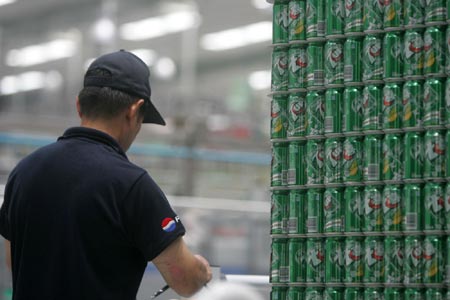-
News >Bizchina
Soft drinks sales may fizz up as economy improves
2010-03-23 09:40
A Pepsi production line in Chongqing. China's soft-drinks output will continue to grow at more than 20 percent a year. [China Foto Press]
BEIJING - China's soft-drinks output will continue to grow at more than 20 percent a year, Xinhua News Agency said, underscoring the potential for companies such as Coca-Cola Co and PepsiCo.Prospects for alcoholic-drinks makers such as Kweichow Moutai Co, the world's second-biggest liquor firm by market value, are also rosy, the news agency said. Combined profit at the nation's makers of traditional spirits grew 26 percent in the first 11 months of 2009, Xinhua said, citing a report from China Non-staple Food Circulation Association.
Rapid economic growth, labor laws protecting workers and rising wages are all contributing to growing personal wealth, allowing more of China's 1.3 billion people to spend money on leisure and entertainment. Atlanta-based Coca-Cola reported that sales grew 29 percent by volume in China in the fourth quarter, helping boost global net income at the world's biggest soft-drinks maker by 55 percent.
Coca-Cola's ambitions in China took a blow in March 2009, when the government blocked its $2.3 billion bid for Huiyuan Juice Group Ltd, the country's biggest juice maker, citing competition concerns. Coca-Cola controlled 52.5 percent of China's soda market by volume in 2008, compared with PepsiCo's 33 percent, according to market research company Euromonitor.
China's growing number of wealthy is also driving changes in the nation's drinking habits, with more people switching to wine made from grapes rather than rice.
China is expected to be the world's seventh-largest consumer of wine by 2013, according to a report by Vinexpo this month. Chinese are projected to drink about 1.26 billion bottles of wine by then, almost a third more than last year, the organizer of wine shows said.
Mainland buyers won at least a quarter of the bids at a Sotheby's wine auction in Hong Kong in January, when a 6-liter bottle of Chateau Lafite 1982 fetched $46,700.
"Many Chinese buy to drink, entertain and impress," Kevin Ching, Sotheby's Asia chief executive, said at the time. "That is good, because it means that they would have to replenish their stock and buy more often," he said.Sotheby's said Hong Kong has surpassed London as the largest market after New York for rare vintages.
High-end spirits will also be a more obvious market trend in the next few years, Xinhua said, citing the report.
